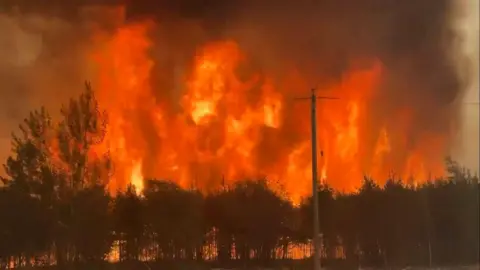Navy plane evacuates residents from Canada wildfire
 EPA-EFE/Shutterstock
EPA-EFE/ShutterstockA navy plane and helicopters are getting used to evacuate residents within the Canadian province of Manitoba from fast-moving wildfires.
1000’s have already evacuated western Canada, notably the central prairie provinces of Saskatchewan and Manitoba, as firefighters face rising flames and scorching, dry climate predictions within the coming days.
Dense smoke from the fires – of which there are greater than 180 in response to officers – has unfold throughout Canada and into components of the US.
Each Saskatchewan and Manitoba have declared states of emergency for the subsequent month and requested for worldwide assist in combating the fires.
Giant components of Alberta and British Columbia have additionally ordered evacuations because the fires unfold.
The evacuation of residents of the northern First Nations group of Pukatawagan, is a “quickly evolving state of affairs”, a Manitoba official informed the BBC.
Canadian Armed Forces, Manitoba Wildfire Service and Manitoba’s Heavy City Search and Rescue Crew have been utilizing a navy plane and helicopters to deliver individuals to security from the northern group in Manitoba.
As of Friday, greater than 2,000 individuals nonetheless wanted to be transported out of Pukatawagan.
In Flin Flon, a metropolis of 5,000 in Manitoba, solely firefighters and assist employees are left within the city.
In Manitoba, there are a complete of 25 fires burning, in response to the province’s hearth state of affairs report, with 10 categorized as uncontrolled.
Whereas Manitoba is dealing with the harshest circumstances, different provinces are additionally coping with worsening wildfires.
In Saskatchewan, there are 16 wildfires burning as of Saturday, with seven categorized as not contained. The Canadian Interagency Forest Hearth Centre (CIFFC) categorized circumstances within the province as excessive.
Danielle Desjardins, a meteorologist with Surroundings and Local weather Change Canada primarily based in Winnipeg, informed the BBC that the forecast for each provinces shouldn’t be promising.
Whereas a chilly entrance is predicted to hit some components of Saskatchewan, it won’t deliver aid to the areas the place fires are burning.
“The unhealthy information about this chilly entrance is it’ll be windy,” mentioned Ms Desjardins, including that the wind, coupled with the warmth and lack of rain, are prime circumstances for wildfire unfold.
Smoke from the fires has additionally left an estimated 22 million People below air high quality alerts this weekend.
Michigan and Wisconsin advisories are at present in place.
In northern Minnesota, residents have been warned smoke might attain ranges “unhealthy for everybody”, whereas the remainder of the state faces air high quality warnings for delicate teams. That alert runs by means of Monday night.
Canada skilled its worst wildfire season on document in 2023, when greater than 42 million acres (17.3m hectares) burned.
Fires occur naturally in lots of components of the world, together with in Canada.
However local weather change is making the climate circumstances wanted for wildfires to unfold extra possible, in response to the UN’s local weather physique.
Excessive and long-lasting warmth attracts an increasing number of moisture out of the bottom and vegetation.


